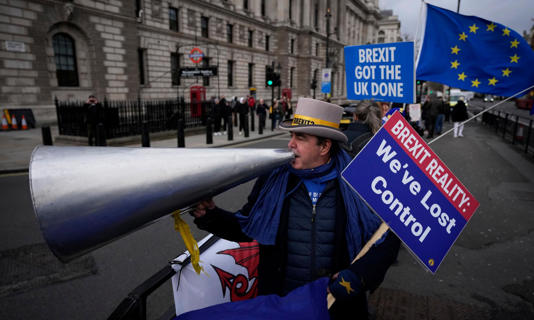According to a landmark poll by Opinium, most Britons now think Brexit has hurt the UK economy, made goods more expensive, and hindered the government’s efforts to regulate immigration. The poll was conducted to commemorate the third anniversary of the UK’s complete departure from the EU single market and customs unions.
According to a survey of over 2,000 UK voters, most people think that Brexit has not brought any benefits to them or the country.
Only one in 10 people (10%) say that leaving the EU has improved their personal finances, while 35% say it has worsened them. Similarly, only 9% say it has been positive for the NHS, while 47% say it has been detrimental. This is bad news for Prime Minister Rishi Sunak, who supported Brexit and argued that it would be good for the economy. However, only 7% of people agree that leaving the EU has helped lower the prices in UK shops, while 63% believe that Brexit has contributed to the inflation and the cost of living crisis.
The poll indicates that after seven and a half years since the referendum and three years since the UK left the single market and customs union, the British public considers Brexit a mistake. Only 22% of voters think it has been beneficial for the UK overall.
Boris Johnson and Michael Gove, the leaders of the Vote Leave Campaign, had claimed that Brexit would improve the economy and trade, as well as bring £350m a week to the NHS and give the government more control over the UK’s borders.
However, James Crouch, the head of policy and public affairs at Opinium, said that most people think that Brexit has been a disaster and has harmed different aspects of UK life: “The public is increasingly unhappy with how the government has handled Brexit, especially in areas that were supposed to be the advantages of leaving the EU.
“Now, half (51%) of Leave voters say that Brexit has been bad for the UK’s ability to control immigration, adding more pressure on an issue the government is weak on. Despite this, Brexit is likely to be less important than the state of the economy and the NHS, which are the main concerns for voters.”
Robert Ford, a politics professor at Manchester University, said that although Brexit’s negative impact on the economy could influence voters at a general election, Brexit was not likely to be as important as it was at the previous two general elections.
Ford said: “Voters have moved on to other issues, with both Leave and Remain voters concerned about the domestic situation of rising costs, failing public services and slow economic growth.
“The slogan of ‘Get Brexit Done’ was not only about finishing the long Brexit process but also about fixing the political system and addressing other long ignored issues. Brexit got done but this has not fixed the political system, and problems elsewhere have only worsened. Many of the voters who supported the Conservatives to bring change now think that changing the Conservatives is necessary to achieve change.
“This change in mood may be especially noticeable among the ‘red wall’ voters who were most enthusiastic about Johnson’s campaign four years ago, but have been most affected by rising costs and crumbling public services since. The final consequence of Brexit may be the breakdown of the Brexit voting bloc.”
One of the main arguments of the Brexiters was that leaving the EU’s single market and customs union would open up new opportunities for global trade for the UK based on trade agreements with other regions of the world. However, many voters now seem to think that Brexit has actually harmed trade. Some 49% think it has been bad for the ability of UK firms to import goods from outside the EU while 15% think it has helped.






